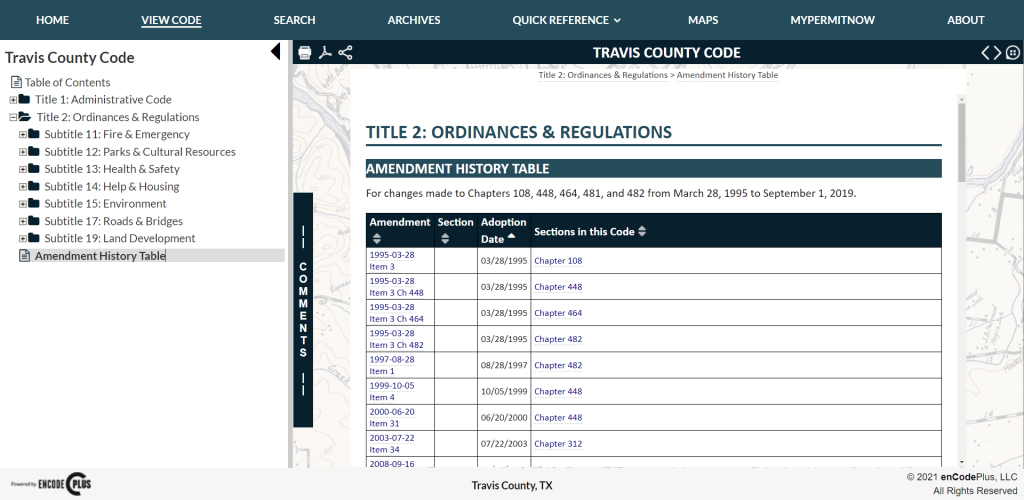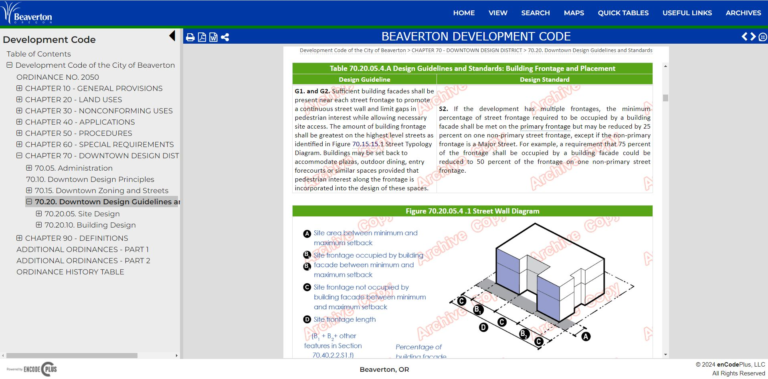Access Historical Versions of Ordinances and Amendments
Table of Contents - Archiving

What is the Value of Historical Archives?
Historical archiving allows planners to track how and when ordinances change

Development occurs over time. Each project observes the regulations and standards in place at the time of plan review and permitting.
However, as a community matures and builds out, different issues and priorities emerge. Regulations must evolve with the ensuing changes.
When new standards are adopted to comply with these updated regulations, subsequent phases of development, expansions, and new development must adhere to their requirements.
Often, preexisting developments no longer conform to current standards. These are referred to as “legally conforming uses, buildings and site improvements.”
While they were legal at the time they were constructed, regulations have changed. Now they’re legal, but no longer conform.
It is the community planner who must track these changes, evaluate variances and ensure conformity.
Easy access to historical archives facilitates swift resolution to conformity issues.
As an example, imagine the following scenario:
A detached garage was permitted and constructed on April 10, 2000. At the time of approval and issuance of the permit, the side and rear yard setbacks were five feet.
But, in 2021, a new zoning ordinance was adopted, increasing the minimum rear yard setback to 20 feet because planners discovered the five-foot setback failed to provide adequate parking.
In 2023, the property owner approached the city about widening the garage. But, because the garage did not meet the current minimum 20-foot, rear-yard setback, it failed to conform, and the rules did not allow for expanding a nonconforming building.
NOW, THERE IS AN EASY ANSWER
With the help of historical archiving, a planner can easily retrieve and review the zoning ordinance in place on April 10, 2000, to discover that the rear setback at the time was five feet.
This quickly makes it clear that while the garage conformed to the code when it was constructed, the regulation has since changed. Because the nonconformity was not caused by the property owner, and was legally nonconforming, a variance may be considered.
Explore sample Historical archives
ADVANTAGES OF HISTORICAL ARCHIVING
- Provide Unlimited Access: Users enjoy 24/7 cloud access to historical archives.
- Track and Sort: Track and sort historical records for any amendment based on various queries.
- Retrieve Records: It's so easy. Simply enter a date to retrieve the regulations in place at that time.
- Download Records: Download any ordinance related to an amendment.
Ordinances themselves can be complex. The series of amendments developed to update them over time creates even more confusion.
enCodePlus’ user-friendly archive feature makes tracking changes simple.
Now it’s easy to understand the evolution of ordinance amendments.
Ready Access to Important Archives?
WE WILL PRODUCE ARCHIVE RECORDS CONCURRENT WITH CODIFICATION
Archives are auto-generated as part of the workflow for codifying ordinances. No extra steps are needed. Archives can be researched and retrieved by ordinance number or date. This means that the code may be recalled as it appeared on any date since it was digitized, or with historic archiving, since it was first adopted. There’s nothing like it!








